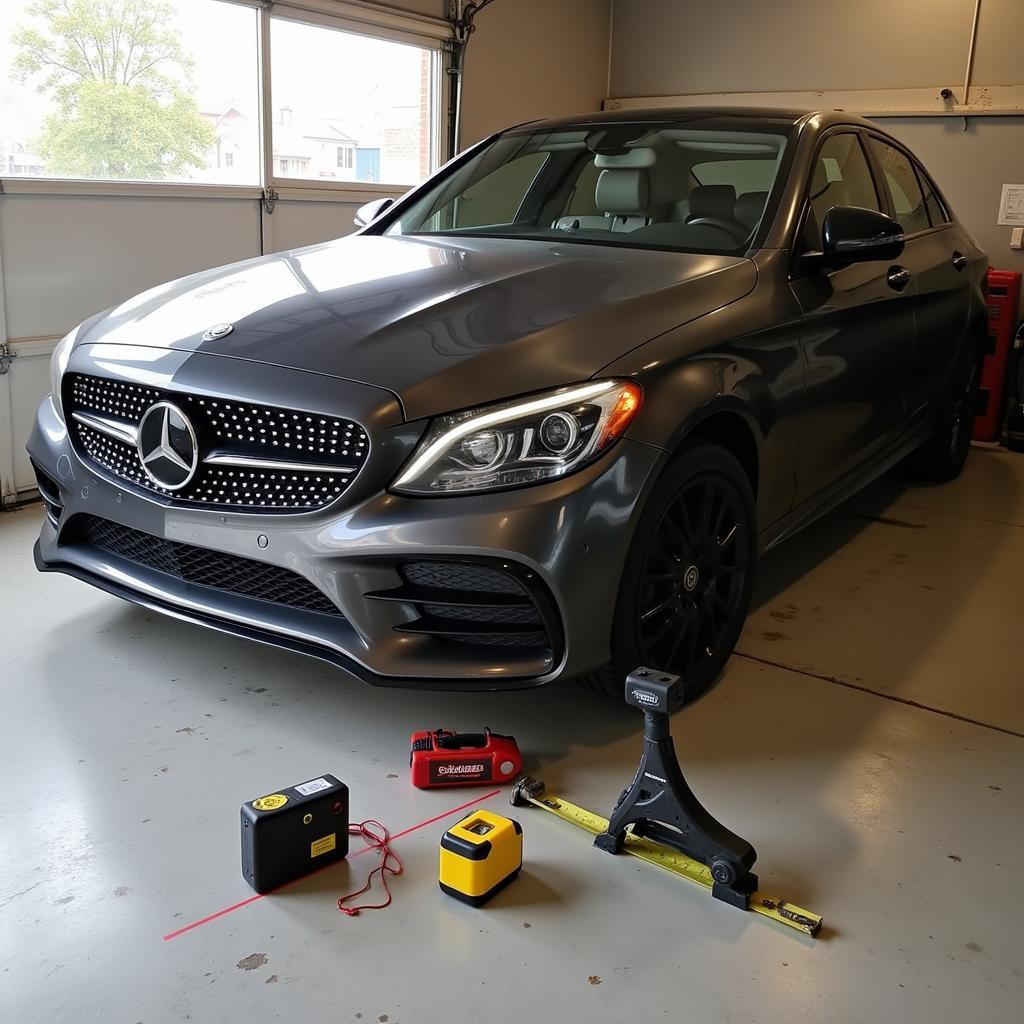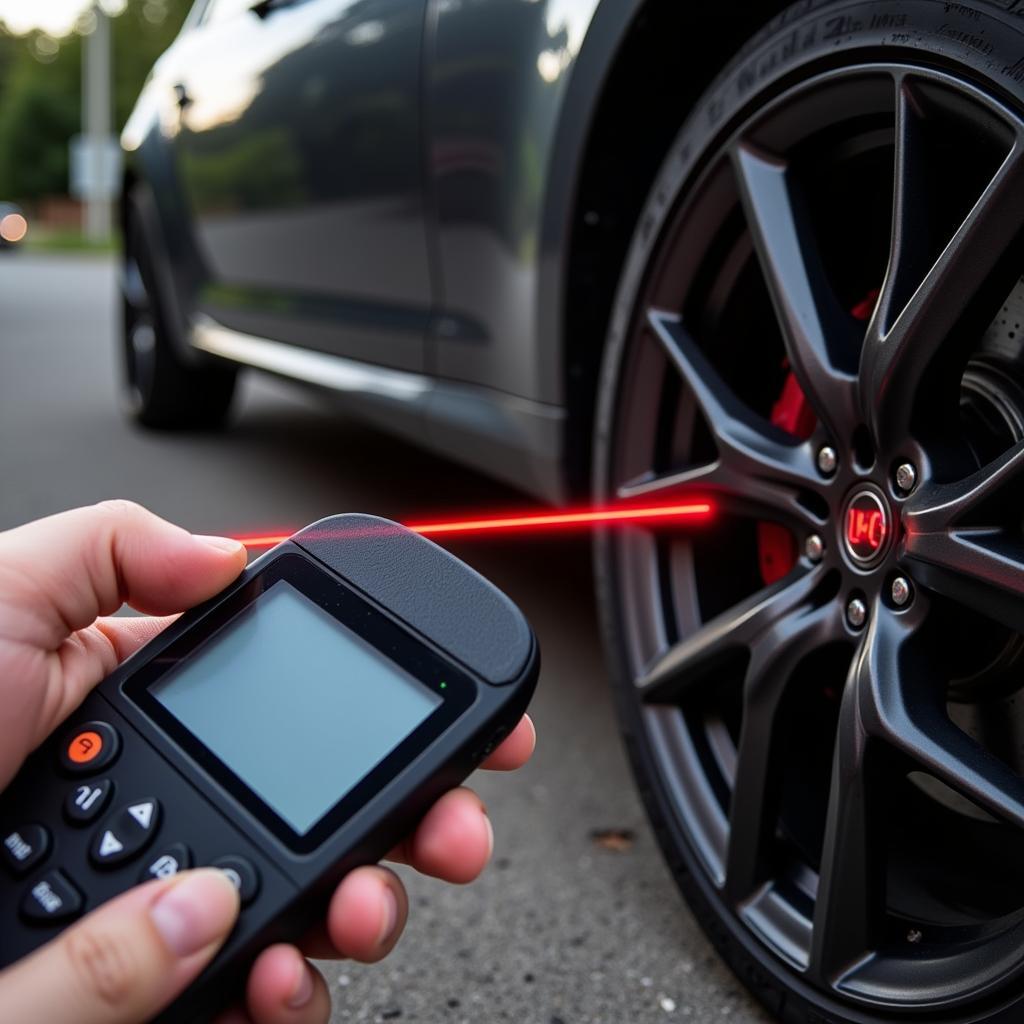Diy Car Alignment Tools offer a tempting prospect for car enthusiasts looking to save money and gain more control over their vehicle’s maintenance. But are they worth the investment? This comprehensive guide dives deep into the world of DIY car alignment, exploring the different types of tools, their effectiveness, and whether they’re the right choice for you.  DIY Car Alignment Tool Setup in a Garage
DIY Car Alignment Tool Setup in a Garage
Understanding Car Alignment and Why It Matters
Proper wheel alignment is crucial for optimal vehicle handling, tire longevity, and fuel efficiency. Misaligned wheels can lead to uneven tire wear, reduced fuel economy, and a compromised driving experience. While professional alignment is recommended, understanding the basics and having access to diy car wheel alignment tools can be beneficial for minor adjustments and regular checks.
Types of DIY Car Alignment Tools
Several DIY car alignment tools cater to varying skill levels and budgets. These tools range from simple measuring tapes and levels to more sophisticated laser alignment systems.
- Tape Measures and Levels: These basic tools can be used for a rough check of toe alignment, but they lack the precision of professional equipment.
- String Alignment Tools: Using strings stretched across the vehicle, these tools provide a more accurate measurement of toe. However, they can be cumbersome to set up.
- Bubble Gauges: These affordable tools attach to the wheel and measure camber and caster angles. They are relatively easy to use but may not be as precise as digital gauges.
- Laser Alignment Systems: These advanced DIY tools offer greater accuracy and ease of use. They project laser beams to measure alignment angles, providing a more professional approach to DIY alignment.
 Using a Laser Car Alignment Tool
Using a Laser Car Alignment Tool
Are DIY Car Alignment Tools Worth It?
The decision of whether or not to invest in diy car wheel alignment tools depends on your mechanical skills, the frequency of alignment checks, and your budget.
When DIY Makes Sense
- Minor Adjustments: For small adjustments to toe, DIY tools can be a cost-effective solution.
- Regular Checks: DIY tools allow for frequent checks, helping you identify potential alignment issues early on.
- Budget Constraints: DIY alignment is significantly cheaper than professional services.
When Professional Alignment is Necessary
- Significant Alignment Issues: For major alignment problems, professional expertise and equipment are essential.
- Lack of Experience: If you’re not comfortable working on your car’s suspension, it’s best to leave alignment to the professionals.
- Specific Vehicle Requirements: Some vehicles require specialized alignment procedures that are best handled by trained technicians.
“DIY alignment can be a great way to maintain your vehicle and save money, but it’s crucial to understand the limitations of DIY tools,” says John Smith, ASE Certified Master Technician. “For complex alignment issues or if you’re unsure about the process, seeking professional help is always recommended.”
Using DIY Car Alignment Tools: A Step-by-Step Guide
Using DIY tools effectively requires careful preparation and attention to detail. While specific instructions vary depending on the tool, here’s a general overview:
- Prepare Your Vehicle: Park on a level surface and ensure your tires are properly inflated.
- Set Up Your Tools: Follow the manufacturer’s instructions for your specific alignment tool.
- Measure Current Alignment: Take initial measurements of your car’s alignment angles.
- Make Adjustments: Carefully adjust the tie rods and other suspension components as needed.
- Recheck Alignment: After making adjustments, remeasure the alignment to ensure it’s within specifications.
Conclusion
DIY car alignment tools can be a valuable asset for car enthusiasts who enjoy working on their vehicles and want to save money on maintenance. However, it’s crucial to choose the right tools for your needs and understand their limitations. Proper use of diy car alignment tools can help you maintain optimal vehicle performance and extend tire life, but for significant alignment issues, professional alignment is always the best course of action.
FAQs
- Can I align my car myself? Yes, with the right tools and knowledge, you can perform basic alignment adjustments.
- What are the signs of misaligned wheels? Uneven tire wear, pulling to one side, and a vibrating steering wheel are common signs.
- How often should I check my car’s alignment? It’s recommended to check your alignment every 12,000 miles or annually.
- What are the benefits of proper wheel alignment? Proper alignment improves handling, increases tire life, and enhances fuel efficiency.
- Are DIY alignment tools accurate? DIY tools can provide reasonable accuracy, especially for minor adjustments.
- What are the most common DIY alignment tools? Tape measures, levels, string alignment tools, bubble gauges, and laser alignment systems.
- Do I need special skills to use DIY alignment tools? Basic mechanical skills and a willingness to follow instructions are necessary.
For further information on car maintenance tools, check out our articles on pulley tool for cars and car headlamp alignment tools. You might also find our guides on cool tools car lifts and car frame repairing tools helpful.
Need assistance? Contact us via WhatsApp: +1(641)206-8880, Email: [email protected] or visit us at 910 Cedar Lane, Chicago, IL 60605, USA. We offer 24/7 customer support.

Leave a Reply